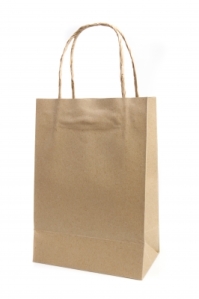Checking out at the supermarket, the young cashier suggested to the much older woman, that she should bring her own grocery bags because plastic bags weren’t good for the environment.
The woman apologised and explained, “We didn’t have this ‘green thing’ back in my earlier days.”
The young cashier responded, “That’s our problem today – your generation did not care enough to save our environment for future generations.”
She was right — our generation didn’t have the ‘green thing’ in its day.
Back then, we returned milk bottles, lemonade bottles and beer bottles to the shop. The shop sent them back to the plant to be washed and sterilised and refilled, so it could use the same bottles over and over. So they really were recycled.
But we didn’t have the “green thing” back in our day.
Grocery shops bagged our groceries in brown paper bags, that we re- Used for numerous things, most memorable besides household bags for rubbish, was the use of brown paper bags as book covers for our schoolbooks. This was to ensure that public property (the books provided for our use by the school), was not defaced by our scribblings. Then we were able to personalise our books on the brown paper bags.
But too bad we didn’t do the “green thing” back then.
We walked up stairs, because we didn’t have a lift in every supermarket, shop and office building. We walked to the local shop and didn’t climb into a 300 horsepower machine every time we had to go half a mile.
But she was right. We didn’t have the “green thing” in our day.
Back then, we washed the baby’s Terry Towel nappies because we didn’t have the throwaway kind. We dried clothes on a line, not in an energy-gobbling machine burning up 3 kilowatts – wind and solar power really did dry our clothes back in our early days. Kids had hand-me-down clothes from their brothers or sisters, not always brand-new clothing.
But that young lady is right; we didn’t have the “green thing” back In our day.
Back then, we had one radio or TV in the house – not a TV in every room and the TV had a small screen the size of a big handkerchief (remember them?), not a screen the size of Scotland In the kitchen. We blended and stirred by hand because we didn’t have electric machines to do everything for us. When we packaged a fragile item to send in the mail, we used wadded up old newspapers to cushion it, not Styrofoam or plastic bubble wrap. Back then, we didn’t fire up an engine and burn petrol just to cut the lawn. We pushed the mower that ran on human power. We exercised by working so we didn’t need to go to a health club to run on treadmills that operate on electricity.
But she’s right; we didn’t have the “green thing” back then.
We drank from a tap or fountain when we were thirsty instead of using a cup or a plastic bottle every time we had a drink of water. We refilled writing pens with ink instead of buying a new pen, and we replaced the razor blades in a razor instead of throwing away the whole razor just because the blade got dull.
But we didn’t have the “green thing” back then.
Back then, people took the bus and kids rode their bikes to school or walked instead of turning their Mums into a 24-hour taxi service in the family’s £50,000 ‘People Carrier’ which cost the same as a whole house did before the “green thing.” We had one electrical outlet in a room, Not an entire bank of sockets to power a dozen appliances and we didn’t need a computerised gadget to receive a signal beamed from satellites 23,000 miles out in space in order to find the nearest pub!
But isn’t it sad that the current generation laments how wasteful we Old Folks were just because we didn’t have the “green thing” back then?
Please forward this on to another selfish old person who needs a lesson in conservation from a smart arse young person…
We don’t like being old in the first place, so it doesn’t take much to piss us off…especially from a tattooed, multiple pierced smart-arse who can’t work out the change without the cash register telling them how much it is!
Here endeth the bloody lesson!





